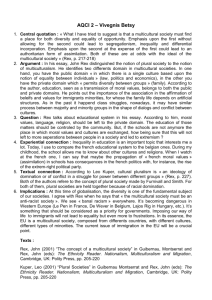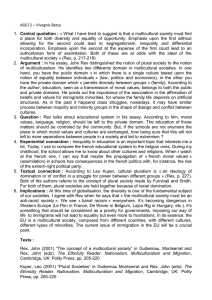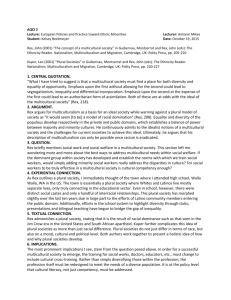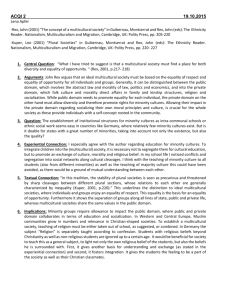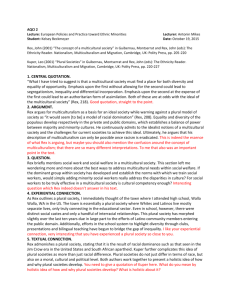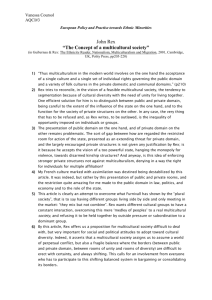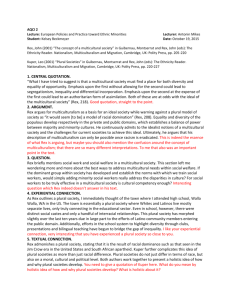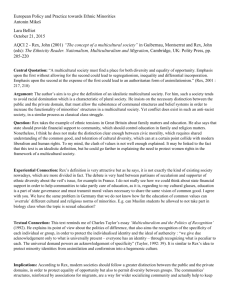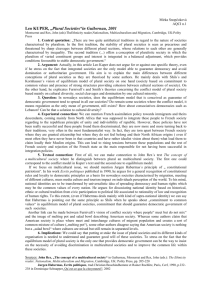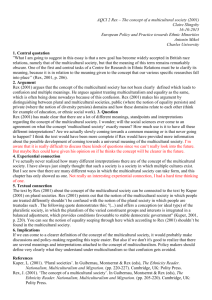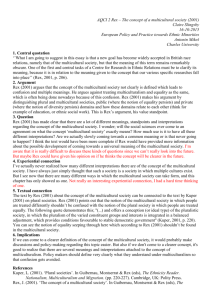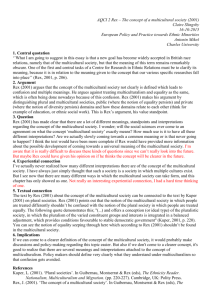AQCI2_Kulesza
advertisement
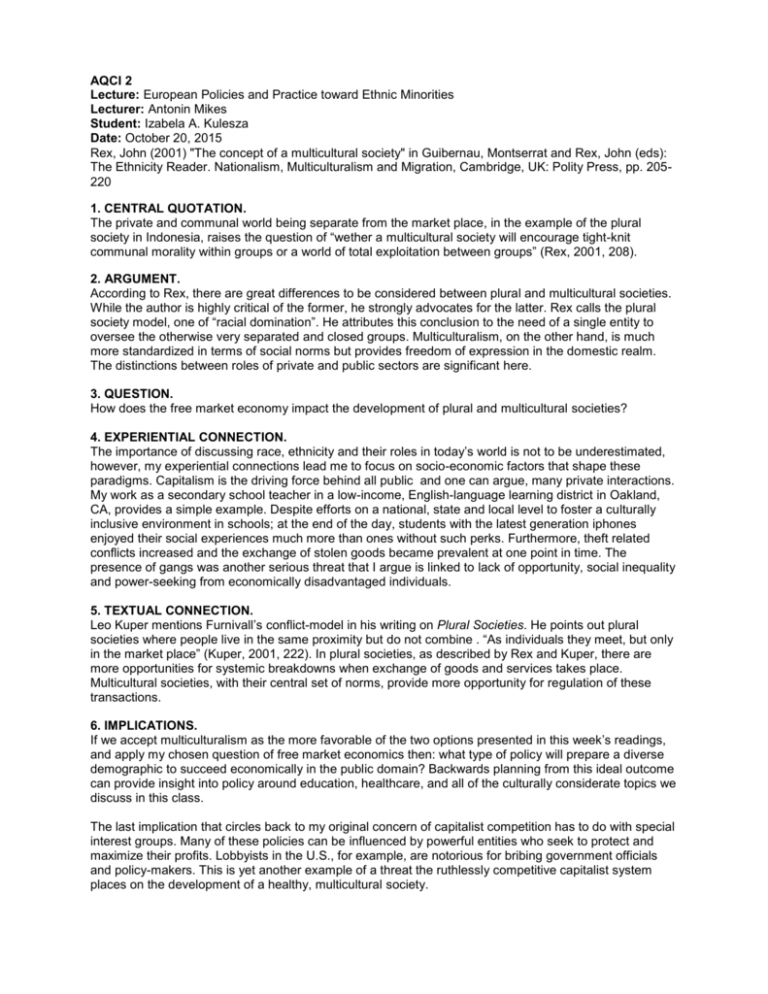
AQCI 2 Lecture: European Policies and Practice toward Ethnic Minorities Lecturer: Antonin Mikes Student: Izabela A. Kulesza Date: October 20, 2015 Rex, John (2001) "The concept of a multicultural society" in Guibernau, Montserrat and Rex, John (eds): The Ethnicity Reader. Nationalism, Multiculturalism and Migration, Cambridge, UK: Polity Press, pp. 205220 1. CENTRAL QUOTATION. The private and communal world being separate from the market place, in the example of the plural society in Indonesia, raises the question of “wether a multicultural society will encourage tight-knit communal morality within groups or a world of total exploitation between groups” (Rex, 2001, 208). 2. ARGUMENT. According to Rex, there are great differences to be considered between plural and multicultural societies. While the author is highly critical of the former, he strongly advocates for the latter. Rex calls the plural society model, one of “racial domination”. He attributes this conclusion to the need of a single entity to oversee the otherwise very separated and closed groups. Multiculturalism, on the other hand, is much more standardized in terms of social norms but provides freedom of expression in the domestic realm. The distinctions between roles of private and public sectors are significant here. 3. QUESTION. How does the free market economy impact the development of plural and multicultural societies? 4. EXPERIENTIAL CONNECTION. The importance of discussing race, ethnicity and their roles in today’s world is not to be underestimated, however, my experiential connections lead me to focus on socio-economic factors that shape these paradigms. Capitalism is the driving force behind all public and one can argue, many private interactions. My work as a secondary school teacher in a low-income, English-language learning district in Oakland, CA, provides a simple example. Despite efforts on a national, state and local level to foster a culturally inclusive environment in schools; at the end of the day, students with the latest generation iphones enjoyed their social experiences much more than ones without such perks. Furthermore, theft related conflicts increased and the exchange of stolen goods became prevalent at one point in time. The presence of gangs was another serious threat that I argue is linked to lack of opportunity, social inequality and power-seeking from economically disadvantaged individuals. 5. TEXTUAL CONNECTION. Leo Kuper mentions Furnivall’s conflict-model in his writing on Plural Societies. He points out plural societies where people live in the same proximity but do not combine . “As individuals they meet, but only in the market place” (Kuper, 2001, 222). In plural societies, as described by Rex and Kuper, there are more opportunities for systemic breakdowns when exchange of goods and services takes place. Multicultural societies, with their central set of norms, provide more opportunity for regulation of these transactions. 6. IMPLICATIONS. If we accept multiculturalism as the more favorable of the two options presented in this week’s readings, and apply my chosen question of free market economics then: what type of policy will prepare a diverse demographic to succeed economically in the public domain? Backwards planning from this ideal outcome can provide insight into policy around education, healthcare, and all of the culturally considerate topics we discuss in this class. The last implication that circles back to my original concern of capitalist competition has to do with special interest groups. Many of these policies can be influenced by powerful entities who seek to protect and maximize their profits. Lobbyists in the U.S., for example, are notorious for bribing government officials and policy-makers. This is yet another example of a threat the ruthlessly competitive capitalist system places on the development of a healthy, multicultural society. AQCI ASSESSMENT FORM Student’s name: Izabela A. Kulesza Essay title: AQCI 2 Name of assessor: Excel lent 1) Is the chosen quotation central to the author’s argument? Go od Lena Apfel Aver age Po or Date: Not accept able 20/10/15 Comments x I think this is very short. Maybe state the differences between public and private domain and what the leading principle in multicultural societies is: equality of respect, and trying to create equality of opportunity. x 2) Has the main argument been fully understood (including its ‘for’ and ‘against’ sides, if applicable)? You could contrast this with the principles of pluralism It would be better to phrase the question differently… do you mean the development of either one of these? x 3a) Is the question raised important/relevant/interesting? 3b) Has this question not been fully answered in the text? x x 4) Is the experiential connection relevant/interesting? x 5a) Is the textual connection relevant/interesting? I do not see the connection to the text, as it does not focus on economic disadvantages, but on the structure of an multicultural state. Are these problems related to minority cultures or integration? 5b) Has it been cited properly? Add the second text also to your sources! x 5c) Has it been adequately explained how the present text's argument contrasts with, contradicts, confirms, clarifies, or elaborates the other text's argument or point? x x 6) Have the implications been well understood, can they have a practical impact for policy making? You didn’t include any suggestions for practical policy making I am also confused as stated in the text how this is connected to multicultural societies and not just capitalism? 7) Expression/Presentation a) Are the style, grammar and general use of English adequate? x b) Is the AQCI professionally presented? x
